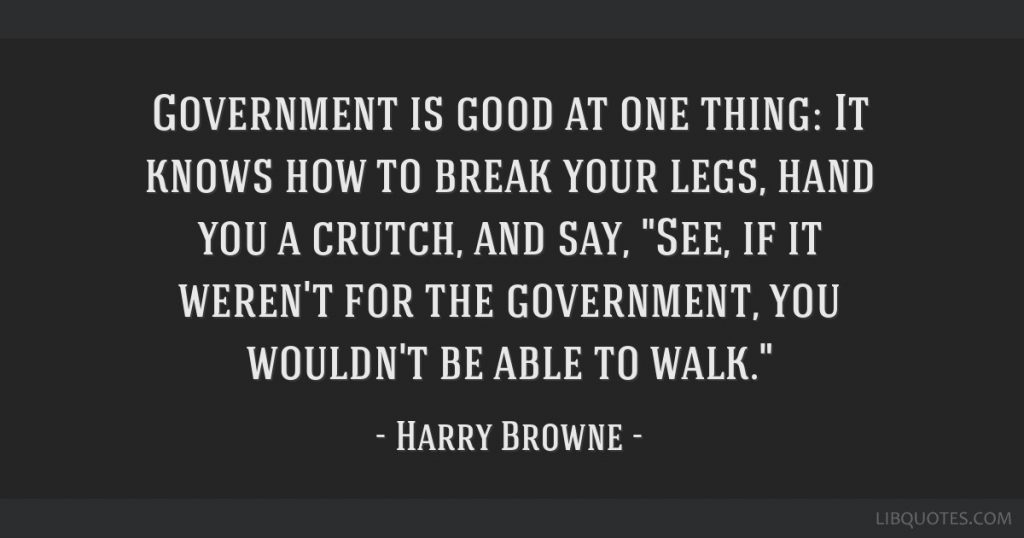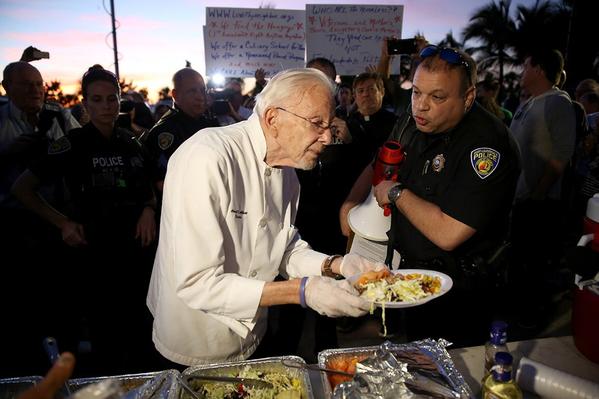The Government Can’t Stand Decentralized Innovations Like Bitcoin, so It Tries to Ruin Them

Feeding the homeless, affordable medicine, an easy-to-use gas can design, starting a small business to meet the needs of one’s community — borderless, permissionless P2P electronic payments. These are all simple, practical activities and tools that can be leveraged in decentralized fashion to benefit human societies immensely. So why do we see governments consistently and violently standing against such progress? One of the latest instances of this suffocation is found in Germany’s shutting down of non-licensed bitcoin ATMs. The examples are virtually unending, though, and the timeline of such oppression as long as the history statism itself.
Also read: German Crypto Regulator BaFin Shuts Down Unauthorized Bitcoin ATMs
Self-Sufficiency Puts the State Out of Business
As the late libertarian writer Harry Browne put it: “Government is good at one thing: It knows how to break your legs, hand you a crutch, and say, ‘See, if it weren’t for the government, you wouldn’t be able to walk.'” It will also tax the wheelchair, the ramps it uses, and make you pay for a license to own it, which, if you do not acquire, will land you in a cage.

Just to get this out of the way, for those unfamiliar with voluntaryism — or the idea that all legitimate human action requires consent — this article will not be advocating for a cartoonish chaos of molotov cocktail “anarchy” with no societal order. That’s an idea reserved for the juvenile and foolish, much like the idea that a few good people (“government”) can successfully dictate how millions of others are to live — by force. Both are pie in the sky hallucinations having little to do with the reality of how things work, and deserving of little attention.
This article aims to examine specific instances of the state crippling human progress, and in the end, making everybody’s life worse for supposedly trying to help and protect people. The picture becomes clear as history repeats itself: the regulators, rulers, politicians and central bankers of the world could give a damn about you. It’s all about control and power, and anything that threatens this stranglehold on innovation and practicality is quickly shut down.

From the Dust Bowl to Bitcoin: Peer-to-Peer Is a Threat to the State
“The people come with nets to fish for potatoes in the river, and the guards hold them back; they come in rattling cars to get the dumped oranges, but the kerosene is sprayed. And they stand still and watch the potatoes float by, listen to the screaming pigs being killed in a ditch and covered with quicklime, watch the mountains of oranges slop down to a putrefying ooze; and in the eyes of the people there is a failure; and in the eyes of the hungry there is a growing wrath.”
-John Steinbeck, The Grapes of Wrath
Part of U.S. President Franklin D. Roosevelt’s agricultural program during the impoverished Dust Bowl era of 1930’s America included destroying surplus crops and forbidding subsidized farmers to grow food, to artificially drive up prices in the then-collapsed, war-inflated economy. So while countless men, women, children and infants starved, their peers were forbidden by law to help them, or to share their produce. Instead it was destroyed, as Steinbeck describes in the passage above.

Modern farms hauntingly suffer from centralized regulation as well, while fruit rots on trees due to a lack of workers resultant from immigration regulations. This is, in effect, the state telling farmers how they may or may not use their private property, and who they may or may not hire. Imagine if farmers could do as they please, and sell food as they liked, or provide jobs on their own property as they saw fit.
Imagine workers being able to seek employment without fear of their families being caged for crossing an arbitrary, non-private property line called a “border.” But that would be decentralized chaos.
Decentralized chaos was also founder of the nonprofit Love Thy Neighbor, Arnold Abbott, who was an elderly man over 90 when arrested by Florida police for feeding the homeless. In fact, he had been arrested multiple times for taking direct, peer-to-peer action to voluntarily help less fortunate members of his community.

As economist Jeffrey Tucker writes in his excellent article, How Government Wrecked the Gas Can:
These days, government is always open to a misery-making suggestion. The notion that public policy would somehow make life better is a relic of days gone by. It’s as if government has decided to specialize in what it is best at and adopt a new principle: ‘Let’s leave social progress to the private sector; we in the government will concentrate on causing suffering and regress.’
In this humorously biting piece, Tucker details how even something as simple as a plastic gas can has been rendered non-functional, more expensive and dangerous by bureaucratic interference making working models illegal. He also details how the private market of users gets around these things. Highly functional “water cans” are now in higher demand, for example.
All of these are examples of how a centralized bureaucracy will never be able to read the market signals of individual economic actors and their needs. The truth is, they don’t want to. Where the violent gun of the state exists, progress is always thwarted, because progress of the private individual means the state becomes increasingly unnecessary.

Literal weeds that grow easily and can relieve pain or decrease severity of seizures are illegal or heavily regulated while state-sanctioned heroine is pushed openly on the populace. Street vendors providing desired services have their wallets emptied by the cops, as licensing rackets in business, medicine, tech, and finance drive costs sky high for consumers and bear witness to the sociopathy.
Genius minds like that of Nikola Tesla, who helped build and design much of the electric infrastructure and invention we know and use today, are referred to as crackpots in modern scientific circles. But who knows how far he could have gone with his ideas of cheap energy for all in an atmosphere of greater financial power and independent, non-centrally-subsidized funding. Finance — the area of control most desperately guarded by government, is ultimately run by people with guns threatening anyone who tries to use their own kind of money freely. This is chaos.
Bitcoin Already Works, No Gov Needed
Bitcoin threatens to remove this pesky leech, and swat the mosquito of centralized control, by making money itself separate from the state. The blockchain is a good example of “anarchy” in action. It’s the same anarchy present in any working society or system where the participants or elements are incentivized and prone to work together.

Most people don’t steal at their neighbor’s yard sale. Most people don’t swerve into oncoming traffic on the highway. Most barbers don’t slit their customers’ throats with the straight razor. Why? Because there is a government or police presence? That would be absurd.
Aside from the fact that most folks are basically good, non-psychopathic people when their primary needs are met, they are also incentivized to cooperate with other individual “nodes” of society. This cooperation makes the overall social network more valuable, and participants benefit. The straight razor barber that kills his customers, on the other hand, will soon be dead, or find his shop empty.
Coming full circle, Germany can remove all the non-regulated bitcoin ATMs it pleases under the guise of fighting crime, and governments can continue to make laws rendering the use of crypto more and more difficult, and trying to turn it into a new fiat with central bank digital currencies. As long as there are people who value innovation, practicality, and freedom, however, bitcoin will continue to be a big middle finger pointed right at the state in the name of decentralized, permissionless order. It already works very well, can be sent and taken anywhere by anyone in relative privacy — and very affordably — and is built on a much better value proposition than the government’s ever-devaluing fiat trash. Of course, thanks to all this practical convenience and benefit to the masses, the state hates it.
What are your thoughts on government regulation of crypto? Let us know in the comments section below.
Op-ed disclaimer: This is an Op-ed article. The opinions expressed in this article are the author’s own. Bitcoin.com is not responsible for or liable for any content, accuracy or quality within the Op-ed article. Readers should do their own due diligence before taking any actions related to the content. Bitcoin.com is not responsible, directly or indirectly, for any damage or loss caused or alleged to be caused by or in connection with the use of or reliance on any information in this Op-ed article.
Images courtesy of Shutterstock, fair use.
Want to create your own secure cold storage paper wallet? Check our tools section. You can also enjoy the easiest way to buy Bitcoin online with us. Download your free Bitcoin wallet and head to our Purchase Bitcoin page where you can buy BCH and BTC securely.
The post The Government Can’t Stand Decentralized Innovations Like Bitcoin, so It Tries to Ruin Them appeared first on Bitcoin News.
from Bitcoin News https://ift.tt/2Q1Azie
Labels: Bitcoin
0 Comments:
Post a Comment
Subscribe to Post Comments [Atom]
<< Home